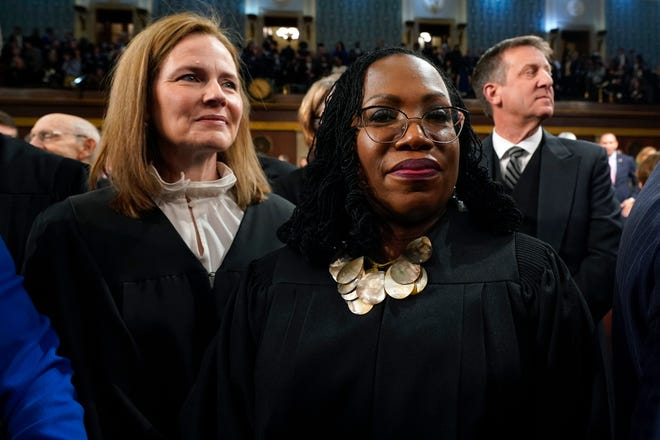WASHINGTON – The Supreme Court on Wednesday rejected a conservative challenge to a government effort to require social media companies to remove posts deemed misinformation, handing the Biden administration an election-year victory.
The 6-3 decision, led by Justice Amy Coney Barrett, was in response to a lawsuit filed during a tumultuous time when social media was awash with contentious posts about COVID-19, vaccines, administration official Dr. Anthony Fauci and other emotive topics. Justices Samuel Alito, Neil Gorsuch and Clarence Thomas dissented.
Barrett, writing the majority opinion, said the challengers argued that free speech on social media is vital to their work as scientists, critics and activists.
“But they fail to point to specific instances of content moderation that caused identifiable harm,” Barrett wrote. “Thus, they fail to demonstrate a sufficiently ‘specific and particularized’ harm.”
more:Supreme Court strikes down Trump administration’s ban on bump stocks for guns
Prepare to vote: See who’s running for president and compare their positions on key issues with our Voter Guide
In dissent, Justice Alito complained that the majority “unjustifiably refuses to address this serious threat to the First Amendment.”
“For months, government officials have applied relentless pressure on Facebook to stifle Americans’ free speech,” Alito wrote.
Alito pointed to an email sent by Biden’s COVID advisers to Facebook executives in March 2021 in which he complained that Facebook had not responded to the administration’s concerns and said, “We are considering our options as to what to do about that.”
By dismissing the case without deciding the fundamental First Amendment issue, the Supreme Court avoided saying whether the government has gone too far when interacting with media platforms about content.
Republican-led states of Missouri and Louisiana, along with five individual social media users, sued to force Facebook, YouTube and X (formerly Twitter) to remove or downgrade the posts, alleging that the White House, Surgeon General and others violated their free speech rights.

The Justice Department said government agencies did not unfairly threaten social media companies., The Justice Department said it encouraged the platforms to remove harmful or false information, including information about vaccines, but did not retaliate against them when they did not comply.
In July 2023, a district court in Louisiana ruled against the administration and imposed broad restrictions on government interactions with social media platforms.
The New Orleans-based 5th U.S. Circuit Court of Appeals relaxed the restrictions, but the Justice Department said they still imposed unprecedented restrictions on how government officials can speak out about matters of public concern, address national security threats or communicate public health information.
The restrictions were put on hold while the Supreme Court reviewed the case.
RelatedSupreme Court defines when public officials can block critics on their personal social media accounts
Experts had called the case, Murthy v. Missouri, a unique opportunity for the court to define how far the government can go to protect against the distribution of harmful content online.
Alex Abdo, litigation director at Columbia University’s Knight First Amendment Institute, said it was disappointing that the Supreme Court did not provide more guidance on the limits the First Amendment places on government pressure efforts.
“This guidance would have been especially valuable in the months leading up to the election,” he told USA Today.
But the Supreme Court said the plaintiffs had not sufficiently demonstrated a connection between the Biden administration’s communications with social media companies and the restrictions on posts.
“To be sure, the record indicates that government defendants played a role in at least some of the platforms’ moderation choices,” Barrett wrote, “but the Fifth Circuit obscured the complexity of the evidence by attributing every platform decision, at least in part, to the defendants.”
Even if there was a link, Barrett wrote, there wasn’t enough evidence to suggest the challengers would suffer future harm.

The majority said they do not expect governments to be effective in blocking communications with companies because platforms continue to enforce their own policies against misinformation about the coronavirus.
“In my opinion, the plaintiffs were right on one point: the potential for government pressure to impinge on First Amendment rights merits careful consideration by the courts,” said Gootman Hans, who helps direct the First Amendment Clinic at Cornell Law School. “But this case was clearly inappropriate for the court to evaluate a free speech issue.”
The Supreme Court also heard another case related to content moderation this year, examining the constitutionality of laws passed in Florida and Texas that limit the ability of social media giants to police user content.
Both lawsuits stem from concerns that conservative voices are being suppressed, including claims about the 2020 election fraud and the origins and treatment of COVID-19.
Rep. Jim Jordan, chairman of the House Judiciary Committee, has argued that the Biden administration has pressured social media companies to censor posts about Hunter Biden’s laptop and COVID-19 vaccines, and said Wednesday that the Supreme Court’s decision demonstrates the need for legislation to protect free expression.
“Our country benefits when ideas are fairly tested and debated on their merits, whether online or in the halls of Congress,” said Jordan, an Ohio Republican.
“While we respectfully disagree with the Court’s decision, our research reveals the need for legislative reforms, such as the Censorship Accountability Act, to better protect Americans harmed by the unconstitutional censorship-industrial complex. Our important work continues.”

